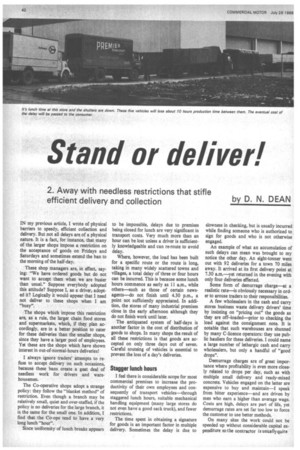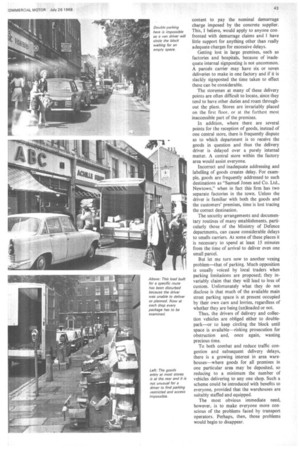Stand or deliver!
Page 44

Page 45

If you've noticed an error in this article please click here to report it so we can fix it.
2. Away with needless restrictions that stifle efficient delivery and collection by D. N. DEAN
IN my previous article, I wrote of physical barriers to speedy, efficient collection and delivery. But not all delays are of a physical nature. It is a fact, for instance, that many of the larger shops impose a restriction on the acceptance of goods on Fridays and Saturdays and sometimes extend the ban to the morning of the half-day.
These shop managers are, in effect, saying: "We have ordered goods but do not want to accept them when we are busier than usual." Suppose everybody adopted this attitude? Suppose I, as a driver, adopted it? Logically it would appear that I need not deliver to these shops when I am "busy".
The shops which impose this restriction are, as a rule, the larger chain food stores and supermarkets, which, if they plan accordingly, are in a better position to cater for these deliveries than the smaller shops, since they have a larger pool of employees. Yet these are the shops which have shown interest in out-of-normal-hours deliveries!
I always ignore traders' attempts to refuse to accept delivery on such occasions, because these bans create a geat deal of needless work for drivers and warehousemen.
The Co-operative shops adopt a strange policy: they follow the "blanket method" of restriction. Even though a branch may be relatively small, quiet and over-staffed, if the policy is no deliveries for the large branch, it is the same for the small one. In addition, I find that the Co-ops tend to have a very long lunch "hour".
Since uniformity of lunch breaks appears to be impossible, delays due to premises being closed for lunch are very significant in transport costs. Very much more than an hour can be lost unless a driver is sufficiently knowledgeable and can re-route to avoid delay.
Where, however, the load has been built for a specific route or the route is long, taking in many widely scattered towns and villages, a total delay of three or four hours can be incurred. This is because some lunch hours commence as early as 11 a.m., while others—such as those of certain newsagents—do not finish until 4.30 p.m., a point not sufficiently appreciated. In addition, the stores of many industrial premises close in the early afternoon although they do not finish work until later.
The antiquated system of half-days is another factor in the cost of distribution of goods to shops. In many shops the result of all these restrictions is that goods are accepted on only three days out of seven. Careful routeing of vehicles is essential to prevent the loss of a day's deliveries.
Stagger lunch hours
I feel there is considerable scope for most commercial premises to increase the productivity of their own employees and consequently of transport vehicles—through staggered lunch hours, suitable mechanical handling equipment (many large stores do not even have a good sack truck), and fewer restrictions.
The time spent in obtaining a signature for goods is an important factor in multiple delivery. Sometimes the delay is due to slowness in checking, but is usually incurred while finding someone who is authorized to sign for goods and who is not otherwise engaged.
An example of what an accumulation of such delays can mean was brought to my notice the other day. An eight-tonner went out with 92 deliveries for a town 70 miles away. It arrived at its first delivery point at 7.30 a.m.—yet returned in the evening with only four deliveries effected.
Some form of demurrage charge—at a realistic rate—is obviously necessary in order to arouse traders to their responsibilities.
A few wholesalers in the cash and carry stores business waste delivery drivers' time by insisting on "pricing out" the goods as they are off—loaded—prior to checking the load against the consignment note. It is notable that such warehouses are shunned by many C-licence operators: they use public hauliers for these deliveries. I could name a large number of lethargic cash and carry wholesalers, but only a handful of "good drops".
Demurrage charges are of great importance where profitability is even more closely related to drops per day, such as with multiple small delivery and ready-mixed concrete. Vehicles engaged on the latter are expensive to buy and maintain I speak from bitter experience—and are driven by men who earn a higher than average wage. Costs are high, delays are part of life, yet demurrage rates are set far too low to force the customer to use better methods.
On many sites the work could not be speeded up without considerable capital expenditure so the contractor is usuallyquite content to pay the nominal demurrage charge imposed by the concrete supplier. This, I believe, would apply to anyone confronted with demurrage claims and I have little support for anything other than really adequate charges for excessive delays.
Getting lost in large premises, such as factories and hospitals, because of inadequate internal signposting is not uncommon. A parcels carrier may have six or seven deliveries to make in one factory and if it is slackly signposted the time taken to effect these can be considerable.
The storemen at many of these delivery points are often difficult to locate, since they tend to have other duties and roam throughout the plant. Stores are invariably placed on the first floor, or at the furthest most inaccessible part of the premises.
In addition, where there are several points for the reception of goods, instead of one central store, there is frequently dispute as to which department is to receive the goods in question and thus the delivery driver is delayed over a purely internal matter. A central store within the factory area would assist everyone.
Incorrect and inadequate addressing and labelling of goods creates delay. For example, goods are frequently addressed to such destinations as "Samuel Jones and Co. Ltd., Newtown," when in fact this firm has two separate factories in the town. Unless the driver is familiar with both the goods and the customers' premises, time is lost tracing the correct destination.
The security arrangements and documentary routines of many establishments, particularly those of the Ministry of Defence departments, can cause considerable delays to smalls carriers. At some of these places it is necessary to spend at least 15 minutes from the time of arrival to deliver even one small parcel.
But let me turn now to another vexing problem—that of parking. Much opposition is usually voiced by local traders when parking limitations are proposed; they invariably claim that they will lead to loss of custom. Unfortunately what they do not disclose is that much of the available main street parking space is at present occupied by their own cars and lorries, regardless of whether they are being (un)loaded or not.
Thus, the drivers of delivery and collection vehicles are obliged either to doublepark—or to keep circling the block until space is available—risking prosecution for obstruction and, once again, wasting precious time.
To both combat and reduce traffic con gestion and subsequent delivery delays, there is a growing interest in area ware houses—where goods for all premises in one particular area may be deposited, so reducing to a minimum the number of vehicles delivering to any one shop. Such a scheme could be introduced with benefits to everyone, provided that the warehouses are suitably staffed and equipped.
The most obvious immediate need, however, is to make everyone more con scious of the problems faced by transport operators. Perhaps, then, those problems would begin to disappear.












































































































